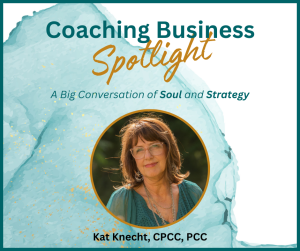I recently wrote a blog for the Co-Active Training Institute that reminded me of the agony I felt when my job had become untenable. I thought I would share some of what I wrote about how to make wise choices to move forward in your coaching career.
“My job is soul-sucking! At times I feel like I am dead.”
Yes, those were pretty dramatic statements for me to make to my mentor at the time. I was going through the CTI certification program, and as I grew my coaching business I was more and more in love with that work.
By contrast, my work on an executive team for the USPS was something I was anxious to leave behind as quickly as I could.
My mentor helped me to see that leaving my job too quickly would be stressful. It might be a temporary relief but the urgency to have income to support myself would not be worth it. I would be so dependent on getting new clients that it would be harder to take the measured steps that make a business sustainable.
I followed this guidance and built up my business over time until I had the foundation I needed to succeed.
That last sentence, though, took time to accomplish, and there were many ups and downs!
A professional coaching career also has its own variety of choices you need to make.
Here are a few.
- The entrepreneurial path is one where you have your own business. This usually includes choosing your niche, your marketing and how you make sales. There are so many varieties with just this one choice!
- The executive path could be where you want to work with executives as an external coach or contractor. Another choice would be to work as an internal coach … or you might want a bit of both.
- There is also the path where you choose to work for an already established organization that matches coaches up with clients. There are many different ways that you can work for a company that contracts coaches for one-on-one coaching.
With these choices, you can add in many more options. Do you want to work only with individual clients? Do you want to work with teams or groups? Do you want to create your own programs and proprietary intellectual property, or would you rather focus on training people using another coach’s approach?
The next pieces you will want to consider are what you need to have in place for your chosen path.
If you are choosing your own business, you will want to create a business foundation just like you would for any other form of entrepreneurship.
If you choose to be an executive coach, you will want to do some research and find organizations you would like to work for or contract with.
This part of the journey is very individual in how long it takes to get to sustainable income. For most coaches, it takes at least 2 years to replace income from a full-time job.
If coaching is your new career path, you have chosen a career that is as feasible and doable – with patience, thought and hard work – as any other career.
Though it hasn’t always been easy, with its share of challenges and triumphs, coaching has been the most fulfilling career path I have ever had and has surpassed my expectations in every way.

 Ep. 16 – Kat Knecht – Navigating the Transition to Full-Time Coaching
Ep. 16 – Kat Knecht – Navigating the Transition to Full-Time Coaching
Unlock the secrets to successfully transitioning into a full-time coaching career with expert insights and real-life strategies. This is your roadmap from day job to dream job, blending practical advice with soulful wisdom from Kat Knecht.




